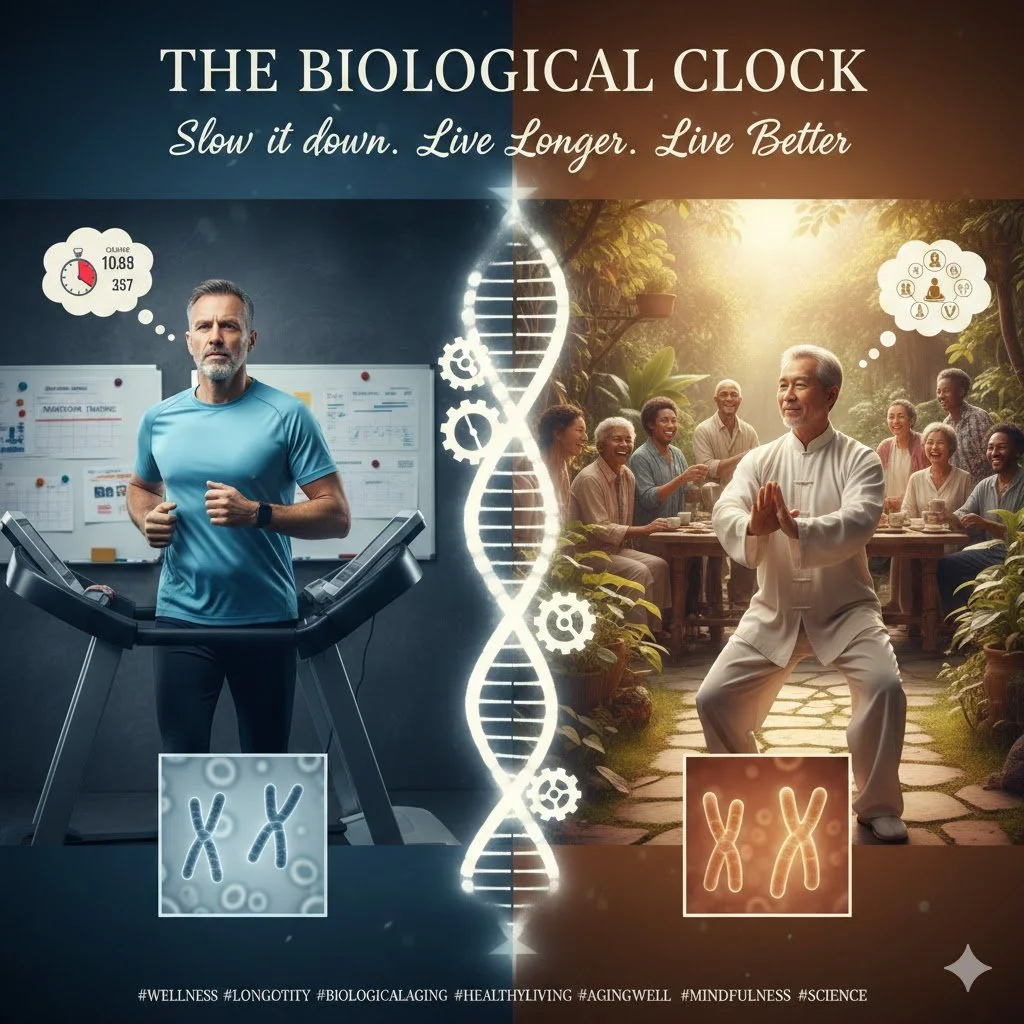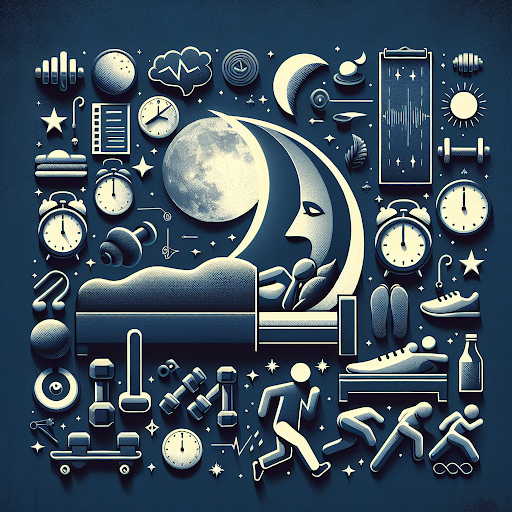Rewiring Aging: The New Science of Wellness
The Secret to Living Longer Isn't What You Think: Why Slowing Your Biological Clock Matters More Than Perfect Health
Picture this: Two 50-year-olds walk into a doctor's office. One runs marathons, follows every health trend, and has perfect blood pressure. The other practices tai chi, maintains deep friendships, and embraces life's challenges with curiosity. Who's actually aging slower? The answer might surprise you.
For decades, we've been chasing wellness like it's a finish line—counting steps, tracking calories, optimizing everything. But what if we've been measuring the wrong thing entirely?
The Real Wellness Revolution: It's Not About Being Healthy, It's About Aging Well
According to groundbreaking research from psychologist George S. Everly Jr., the ultimate wellness hack isn't about achieving perfect health metrics. It's about something far more profound: slowing down your biological aging process at the cellular level.
Here's where it gets fascinating. While your chronological age ticks forward predictably (happy birthday!), your biological age—the actual wear and tear on your cells—is surprisingly negotiable. Scientists have discovered that the tiny caps on your chromosomes called telomeres, along with something called DNA methylation patterns, act like biological clocks. And here's the kicker: we can actually influence how fast these clocks tick.
The Science That Changes Everything
Think of telomeres as the plastic tips on shoelaces—they protect your DNA from unraveling. Every time your cells divide, these telomeres get a bit shorter, like a biological hourglass marking time. When they get too short, cells stop dividing properly, leading to the diseases we associate with aging: cardiovascular disease, neurodegeneration, and more.
But here's where hope enters the equation. Research shows that certain lifestyle factors can actually preserve or even lengthen these telomeres. We're not talking about fountain-of-youth fantasy here—we're talking about solid science suggesting we could add 1.5 to 8 years of healthy life compared to the general population.
The Four Pillars of Biological Youth
What makes this approach revolutionary is its holistic nature. Instead of obsessing over a single health metric, slowing biological aging requires harmony across four interconnected dimensions:
Psychological Wellness: This isn't just about being stress-free (who is?). It's about developing resilience. Everly's research reveals something counterintuitive: embracing life's challenges actually contributes to cellular health. Those who view difficulties as opportunities for growth rather than punishments show better biological aging markers.
Physical Wellness: Yes, movement matters, but not in the way you might think. It's less about achieving peak fitness and more about consistent, enjoyable activity that doesn't flood your system with stress hormones. Think slow breathing exercises that activate your parasympathetic nervous system, reducing inflammation at the cellular level.
Spiritual Wellness: Before you roll your eyes, this isn't necessarily about religion. It's about connection to something larger than yourself—whether that's nature, community, or purpose. This sense of meaning has measurable effects on those cellular clocks we mentioned.
Social Wellness: Perhaps the most underestimated factor. Strong social connections don't just make life more enjoyable; they create a biological buffer against aging. Loneliness, it turns out, accelerates cellular aging as much as smoking.
The Mindfulness Connection
Here's where ancient wisdom meets cutting-edge science. Practices like mindfulness and slow, deliberate breathing—long dismissed as "woo-woo" by skeptics—turn out to have profound effects on our biology. When you activate your parasympathetic nervous system through these practices, you're not just feeling calmer; you're literally reducing the inflammation that accelerates aging at the cellular level.
Studies show that regular mindfulness practice can maintain telomere length and improve DNA methylation patterns. In other words, that meditation app on your phone might be more powerful than any anti-aging cream.
Reframing the Challenge
Perhaps the most radical shift this research suggests is in how we view life's obstacles. We've been conditioned to see stress, challenges, and difficulties as things to avoid—enemies of wellness. But what if they're actually essential ingredients?
Everly's research suggests that those who frame challenges as integral to growth—rather than punishments to endure—show better biological aging markers. It's not about avoiding stress; it's about changing our relationship with it. This psychological reframe might be one of the most powerful tools we have for slowing our biological clocks.
Your Personal Longevity Laboratory
The beauty of this approach is that you don't need expensive equipment or complicated protocols. Your daily life becomes your laboratory for longevity. Every interaction, every breath, every challenge becomes an opportunity to influence your biological age.
Start small. Take five minutes for slow, deliberate breathing. Call that friend you've been meaning to catch up with. Reframe tomorrow's big presentation from a threat to an opportunity for growth. These aren't just feel-good activities—they're interventions at the cellular level.
The Bottom Line: Time Is More Negotiable Than You Think
We're standing at the threshold of a wellness revolution. Not one based on optimization and perfection, but on understanding and working with our deepest biological processes. The science is clear: how we age is far more within our control than we ever imagined.
This isn't about adding years to your life (though that's a nice bonus). It's about adding life to your years—maintaining vitality, clarity, and purpose as the calendar pages turn. It's about recognizing that true wellness isn't a destination but a dynamic dance with time itself.
The ultimate wellness hack isn't a hack at all. It's a fundamental shift in how we approach living. By focusing on slowing biological aging through psychological resilience, mindful movement, spiritual connection, and social bonds, we're not just living healthier—we're literally living younger.
So here's my question for you: If you knew you could influence your biological age starting today, what one change would you make first? Would you finally start that meditation practice? Reach out to rebuild a friendship? Or perhaps reframe that challenge you're facing as an opportunity for cellular rejuvenation?
Share your thoughts below, and let's start a conversation about what real wellness looks like when we stop chasing perfection and start embracing the beautiful complexity of aging well.




